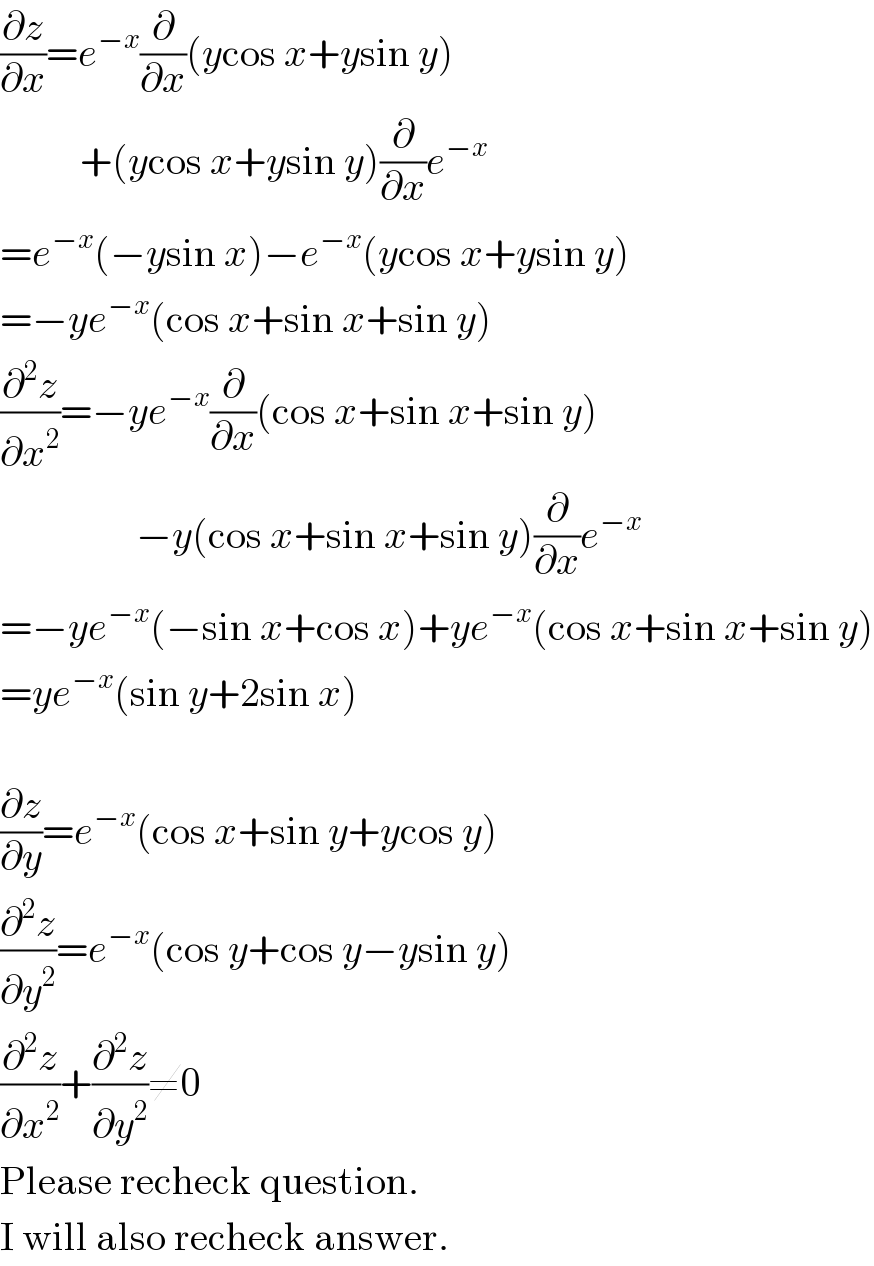
Question Number 13544 by aishadenge last updated on 20/May/17

Commented by prakash jain last updated on 20/May/17

$$\mathrm{What}\:\mathrm{is}\:{z}? \\ $$
Commented by aishadenge last updated on 20/May/17

$${the}\:{top}\:{part}\:{is}\:{equated}\:{to}\:{z}\:{not}\:{x}.\:{sorry}\: \\ $$$${for}\:{the}\:{error}. \\ $$
Commented by prakash jain last updated on 21/May/17

$$\frac{\partial{z}}{\partial{x}}={e}^{−{x}} \frac{\partial}{\partial{x}}\left({y}\mathrm{cos}\:{x}+{y}\mathrm{sin}\:{y}\right) \\ $$$$\:\:\:\:\:\:\:\:\:\:+\left({y}\mathrm{cos}\:{x}+{y}\mathrm{sin}\:{y}\right)\frac{\partial}{\partial{x}}{e}^{−{x}} \\ $$$$={e}^{−{x}} \left(−{y}\mathrm{sin}\:{x}\right)−{e}^{−{x}} \left({y}\mathrm{cos}\:{x}+{y}\mathrm{sin}\:{y}\right) \\ $$$$=−{ye}^{−{x}} \left(\mathrm{cos}\:{x}+\mathrm{sin}\:{x}+\mathrm{sin}\:{y}\right) \\ $$$$\frac{\partial^{\mathrm{2}} {z}}{\partial{x}^{\mathrm{2}} }=−{ye}^{−{x}} \frac{\partial}{\partial{x}}\left(\mathrm{cos}\:{x}+\mathrm{sin}\:{x}+\mathrm{sin}\:{y}\right) \\ $$$$\:\:\:\:\:\:\:\:\:\:\:\:\:\:\:\:\:−{y}\left(\mathrm{cos}\:{x}+\mathrm{sin}\:{x}+\mathrm{sin}\:{y}\right)\frac{\partial}{\partial{x}}{e}^{−{x}} \\ $$$$=−{ye}^{−{x}} \left(−\mathrm{sin}\:{x}+\mathrm{cos}\:{x}\right)+{ye}^{−{x}} \left(\mathrm{cos}\:{x}+\mathrm{sin}\:{x}+\mathrm{sin}\:{y}\right) \\ $$$$={ye}^{−{x}} \left(\mathrm{sin}\:{y}+\mathrm{2sin}\:{x}\right) \\ $$$$ \\ $$$$\frac{\partial{z}}{\partial{y}}={e}^{−{x}} \left(\mathrm{cos}\:{x}+\mathrm{sin}\:{y}+{y}\mathrm{cos}\:{y}\right) \\ $$$$\frac{\partial^{\mathrm{2}} {z}}{\partial{y}^{\mathrm{2}} }={e}^{−{x}} \left(\mathrm{cos}\:{y}+\mathrm{cos}\:{y}−{y}\mathrm{sin}\:{y}\right) \\ $$$$\frac{\partial^{\mathrm{2}} {z}}{\partial{x}^{\mathrm{2}} }+\frac{\partial^{\mathrm{2}} {z}}{\partial{y}^{\mathrm{2}} }\neq\mathrm{0} \\ $$$$\mathrm{Please}\:\mathrm{recheck}\:\mathrm{question}. \\ $$$$\mathrm{I}\:\mathrm{will}\:\mathrm{also}\:\mathrm{recheck}\:\mathrm{answer}. \\ $$
Commented by mrW1 last updated on 21/May/17

$${maybe}\:\boldsymbol{{z}}=\boldsymbol{{e}}^{−\boldsymbol{{x}}} \left(\boldsymbol{{y}}\:\boldsymbol{\mathrm{cos}}\:\boldsymbol{{x}}+\boldsymbol{{x}}\:\boldsymbol{\mathrm{sin}}\:\boldsymbol{{y}}\right)\:\:? \\ $$
Commented by aishadenge last updated on 21/May/17

$${thank}\:{you}. \\ $$
Commented by aishadenge last updated on 21/May/17

$${i}\:{checked}.\:{it}\:{is}\:\boldsymbol{{ycosx}}+\boldsymbol{{xsiny}}\:\:\:{indeed} \\ $$
